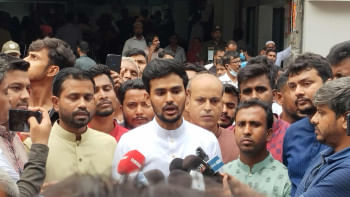Solar tech success inspires many innovators

The rapid spread of solar technology is acting as a catalyst for incredible product innovation, many of which were on display at the IDCOL Green Energy Expo yesterday.
One such product is the Super Optimiser System by Innovative Technologies. The system allows users to control their lights' luminosity with the single press of a switch on the bulb or tube.
For example, pressing the light switch the first time will activate full capacity; another press within two seconds would halve the wattage and a third press will bring it down to 20 percent illumination.
“It is an innovative system, especially designed for powering solar LED lights or bulbs,” said Noor Hossain, managing director of Innovative Technologies.
The system, which has an intelligent driver, is a cost-effective solution.
The device helps reduce power consumption due to its ability to control illumination as per requirement.
The device is also protected from cable voltage drops, meaning it gives the same brightness across distance in solar home systems, said Hossain.
Innovative Technologies, which started making Super Optimiser in 2012 at BSCIC Electronics Complex in Mirpur, is now supplying such devices to Infrastructure Development Company Ltd-authorised suppliers of the Solar Home Systems (SHSs) programme. LED lights and bulbs that have the inbuilt super optimiser system cost Tk 270-550 per unit, and they come with three years' warranty.
With the popularity of Solar Home Systems, the country is witnessing lots of innovations on electronic devices, said Hossain, who started the company with four friends in 1998 with little capital but a pocketful of beliefs.
Innovative Technologies, which sells a number of products such as DC LED lamp, tube light, inverter, charge controller, solar power bank, earns around Tk 1 crore in revenue a year and is valued at around Tk 10 crore, he said.
The company, which employs around 120 people, also plans to make such devices for conventional electricity use within the next six months.
Meanwhile, farmers in off-grid areas may finally be able to access cold storage facilities thanks to efforts of Solargao Ltd, a renewable energy solution provider.
The company has already developed solar cold storage facilities for preserving seeds and vegetables in different sizes on a pilot basis. The Gao Cold Storage, run by 5 kilowatt-hour (kWh) of solar power, keeps the temperature below 5 degree Celsius, according to Shah Noman Partho, the company's director.
The main purpose of developing the system is to reduce post-harvest losses and waste and ensure fair market prices for farmers by avoiding over-supply due to lack of storage facilities, he said.
Solargao has already got a good response, he said, adding that the company will soon launch commercial production of the storage facility.
The price of the cold storage will be between Tk 7 lakh and Tk 15 Lakh.
Another unusual product at the fair was the air purifying energy saving lamp by China-Bangladesh Electronics, a leading LED lamp manufacturer.
The air purifying lamp can save up to 80 percent of energy and clean the air by removing indoor allergens like pollen, dust, mould spores and tobacco smoke, said Alauddin Bhuiyan, the company's sales executive.
The lamp has an advanced built-in ioniser that releases healthy negative ions, which are naturally found.
The company is producing such lamps in a range of luminosity; their prices range from Tk 400 to Tk 572.
Some 50 companies are participating in the two-day fair on renewable energy at the capital's Sonargaon Hotel. The fair, organised by Idcol, ends today.
Idcol also celebrated the installation of three million SHSs in the country at the fair. The three million SHSs are currently generating 135 megawatts of electricity in off-grid areas, where electricity may not even reach in near future.
As a result, more than 15 million people are benefitting from solar electricity for lighting, watching TV, charging mobile phones and other low-load appliances.
As of May, more than 3.1 million SHSs have been installed with support from the World Bank and other development partners, according to Idcol, the implementing agency.
Idcol, the state owned non-banking financial institution, has now set a target to finance six million such systems by 2017.

 For all latest news, follow The Daily Star's Google News channel.
For all latest news, follow The Daily Star's Google News channel. 



Comments